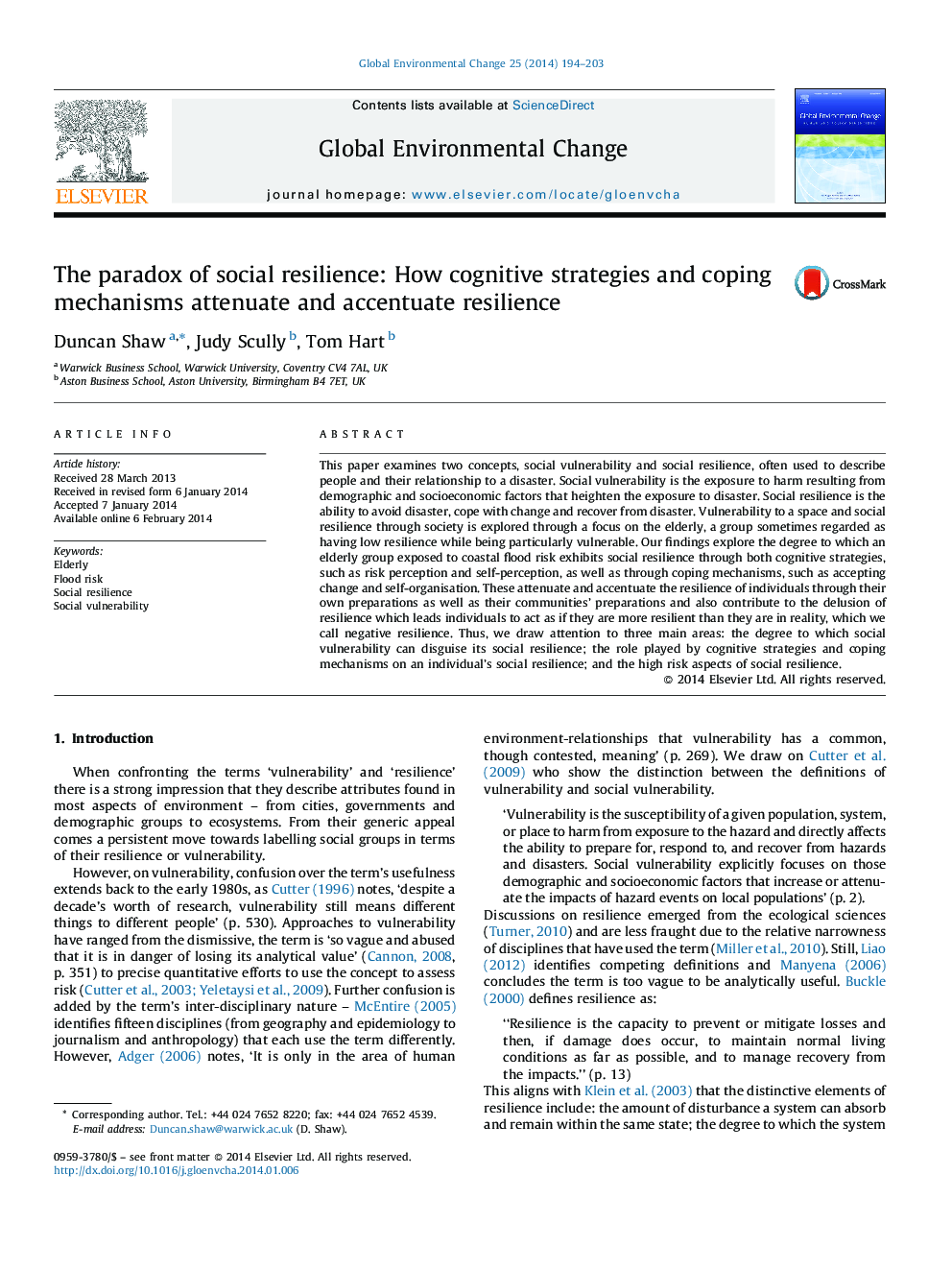| کد مقاله | کد نشریه | سال انتشار | مقاله انگلیسی | نسخه تمام متن |
|---|---|---|---|---|
| 7470597 | 1485133 | 2014 | 10 صفحه PDF | دانلود رایگان |
عنوان انگلیسی مقاله ISI
The paradox of social resilience: How cognitive strategies and coping mechanisms attenuate and accentuate resilience
ترجمه فارسی عنوان
پارادوکس انعطاف پذیری اجتماعی: چگونه استراتژی های شناختی و مکانیزم های مقابله با انعطاف پذیری را تشدید می کند
دانلود مقاله + سفارش ترجمه
دانلود مقاله ISI انگلیسی
رایگان برای ایرانیان
کلمات کلیدی
مسن، خطر سیل، انعطاف پذیری اجتماعی، آسیب پذیری اجتماعی،
ترجمه چکیده
این مقاله دو مفهوم، آسیب پذیری اجتماعی و انعطاف پذیری اجتماعی را بررسی می کند که اغلب برای توصیف افراد و ارتباط آنها با یک فاجعه استفاده می شود. آسیب پذیری اجتماعی، قرار گرفتن در معرض آسیب است که از عوامل جمعیت شناختی و اجتماعی و اقتصادی است که افزایش قرار گرفتن در معرض فاجعه را افزایش می دهد. انعطاف پذیری اجتماعی توانایی اجتناب از فاجعه، مقابله با تغییرات و بهبود فاجعه است. آسیب پذیری به فضای و انعطاف پذیری اجتماعی از طریق جامعه، با تمرکز بر افراد مسن، گروهی گاهی اوقات به عنوان انعطاف پذیری پایین در حالی که به ویژه آسیب پذیر هستند، مورد بررسی قرار می گیرد. یافته های ما کشف درجه ای که یک فرد سالخورده در معرض خطر سیلاب ساحلی، انعطاف پذیری اجتماعی را از طریق هر دو استراتژی شناختی مانند ادراک ریسک و ادراک خود، و همچنین از طریق سازوکار های مقابله ای مانند پذیرش تغییر و خود-سازمانی، نشان می دهد. این کاهش و انعطاف پذیری افراد را از طریق آمادگی خود و همچنین آمادگی جوامع خود و همچنین به منحرف شدن انعطاف پذیری منجر می شود که باعث می شود افراد رفتار کنند، به نحوی که انعطاف پذیرتر از آنچه در واقعیت هستند، که ما آن را انعطاف پذیری منفی می نامیم. بنابراین، ما به سه حوزه اصلی توجه می کنیم: درجه ای که آسیب پذیری اجتماعی می تواند انعطاف پذیری اجتماعی خود را پنهان کند؛ نقش استراتژی های شناختی و مکانیسم های مقابله با انعطاف پذیری اجتماعی فرد؛ و جنبه های خطر بالای انعطاف پذیری اجتماعی.
موضوعات مرتبط
علوم زیستی و بیوفناوری
علوم محیط زیست
علوم زیست محیطی (عمومی)
چکیده انگلیسی
This paper examines two concepts, social vulnerability and social resilience, often used to describe people and their relationship to a disaster. Social vulnerability is the exposure to harm resulting from demographic and socioeconomic factors that heighten the exposure to disaster. Social resilience is the ability to avoid disaster, cope with change and recover from disaster. Vulnerability to a space and social resilience through society is explored through a focus on the elderly, a group sometimes regarded as having low resilience while being particularly vulnerable. Our findings explore the degree to which an elderly group exposed to coastal flood risk exhibits social resilience through both cognitive strategies, such as risk perception and self-perception, as well as through coping mechanisms, such as accepting change and self-organisation. These attenuate and accentuate the resilience of individuals through their own preparations as well as their communities' preparations and also contribute to the delusion of resilience which leads individuals to act as if they are more resilient than they are in reality, which we call negative resilience. Thus, we draw attention to three main areas: the degree to which social vulnerability can disguise its social resilience; the role played by cognitive strategies and coping mechanisms on an individual's social resilience; and the high risk aspects of social resilience.
ناشر
Database: Elsevier - ScienceDirect (ساینس دایرکت)
Journal: Global Environmental Change - Volume 25, March 2014, Pages 194-203
Journal: Global Environmental Change - Volume 25, March 2014, Pages 194-203
نویسندگان
Duncan Shaw, Judy Scully, Tom Hart,
